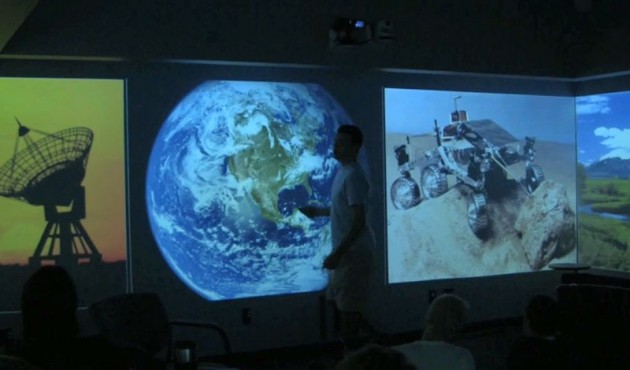RENCI and its North Carolina partners at Duke and NC State universities will feature their work in an exhibit at SC11, the world’s premier conference for high performance computing, networking, storage and analysis, Nov. 14 – 17. Read more
RENCI to demonstrate on-demand resources and provisioning at SC11
SEATTLE, Nov. 1, 2011–Scientists studying data or compute-intensive problems require high bandwidth and computational resources, often from heterogeneous systems at different sites.
But they don’t need these resources all the time.
Ideally, a scientist studying the properties of new materials for producing solar energy, for example, would be able to grab a “slice” of a high-bandwidth pipeline, set their workflow in motion, grab compute resources in the cloud and then release those resources, so they could be used by other researchers in different configurations. Read more
Look out PowerPoint: UNC students use Social Computing Room as a presentation tool
To paraphrase Marshall McLuhan, change the communication medium and you’ve changed the message.
It’s a concept that’s well understood by the students in Rebecca Nesvet’s English 102, (Writing in the Disciplines) classes at UNC Chapel Hill.
This semester, students worked in teams to develop presentations on a wide range of scientific fields of inquiry. But instead of expecting the usual PowerPoint slides filled with bulleted talking points, Nesvet brought them to RENCI’s Social Computing Room and turned them loose. The room, with a floor-to-ceiling computer desktop that projects on all four walls, allows users to immerse themselves in panoramic montages of data and images. Read more
Putting data in its place
Understanding data often requires understanding the geography associated with it.
Hurricane and storm surge models mean little unless tied to a specific location. Trends in diseases and public health can be spotted and analyzed by comparing data from different counties, regions or states. Read more
To understand human-induced global changes, there’s no place like dome
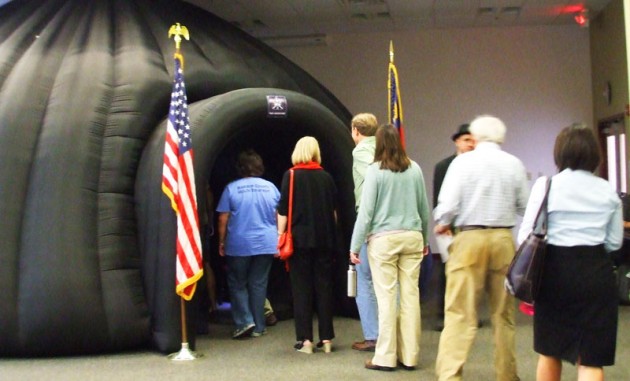
Asheville area community members enter a portable dome to experience Living Maps: From Cosmos to Community.
Story by Nancy Foltz
ASHEVILLE, NC—Experts from American institutions known for their pioneering efforts in Earth systems research, education and evaluation have come together to turn economic literacy education on its ear, and RENCI is part of the effort.
The new initiative known as the Worldviews Network seeks to create innovative approaches for engaging the American public in dialogues about human-induced global changes. Using immersive visualization within the nation’s 600 planetariums and other domed settings to enhance the visual experience, the Worldviews partners are creating tools and techniques for science educators that will help audiences visualize, comprehend and address complex issues from whole-systems perspectives. The goal is to illustrate how large-scale global processes such as biodiversity loss, climate change and ocean acidification relate to the places where we live by customizing content for issues of regional importance. Read more
National Science Foundation taps Carolina researchers to develop national data infrastructure
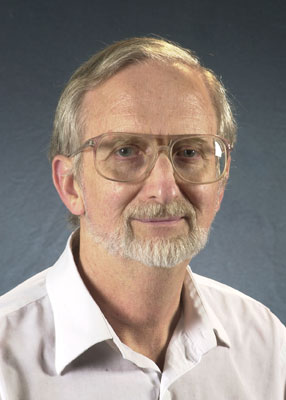
Reagan Moore, Ph.D., the principal investigator for the consortium, director of the DICE Center, SILS professor and domain scientist for data management at RENCI.
CHAPEL HILL, NC, Sept. 28, 2011–The National Science Foundation has funded the University of North Carolina at Chapel Hill to lead a multi-institutional team that will build and deploy a prototype national data management infrastructure that addresses some of the key data challenges facing scientific researchers in the digital age.
The infrastructure will support collaborative multidisciplinary research through shared collections, data publication within digital libraries and reference collections within persistent archives.
The NSF awarded nearly $8 million over five years to the DataNet Federation Consortium (DFC), a group that spans seven universities. The DFC will address the data management needs of six science and engineering disciplines: oceanography, hydrology, engineering design, plant biology, cognitive science, and social science. About half the award will support research and development at UNC-Chapel Hill. Read more
SUPER Institute to help scientists exploit DOE leadership class computing systems
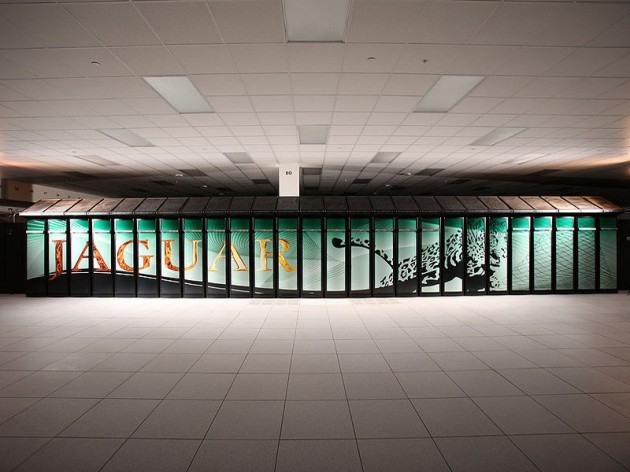
Jaguar, at Oak Ridge National Laboratory, currently reigns as the fastest supercomputer at a U.S. Department of Energy lab.
CHAPEL HILL, NC–High performance computing (HPC) researchers at the Renaissance Computing Institute at UNC Chapel Hill (RENCI) will collaborate in a nationwide research effort designed to ensure that scientists will be able to take full advantage of some of the world’s largest computing systems at U.S. Department of Energy laboratories.
Matchmakers
Prostate cancer, the most common form of cancer in U.S. men, is also one of the most treatable: 90 percent of patients who undergo intensity modulated radiation therapy (IMRT) in the early stages are disease free after five years, according to the journal Seminars in Radiation Oncology. Read more
RENCI-Duke project aims to use data to improve medical treatment decisions

CHAPEL HILL, NC, July 22, 2011–A R21 NIH exploratory/developmental research grant from the Agency for Healthcare Research and Quality (AHRQ) will enable RENCI and Duke University to develop a system that aggregates and visualizes historical medical data so doctors can use it to help them make the best possible treatment decisions for their patients. Read more
UNC startup tests e-gaming prototype aimed at promoting youth fitness
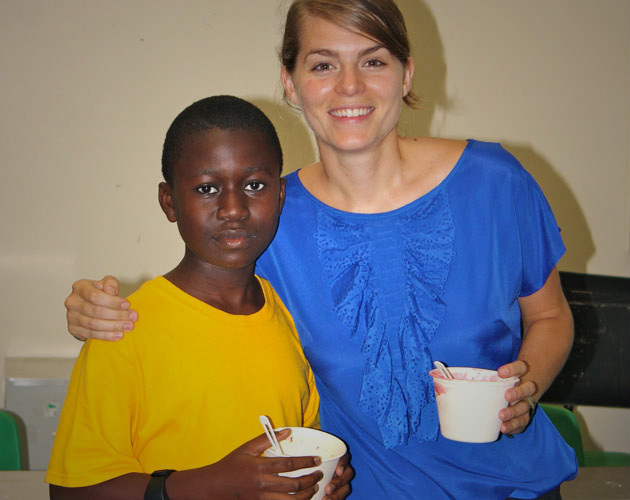
Carolina Saunders, 7th grade head of Student U, enjoys a healthy cup of frozen yogurt with one of her students.
DURHAM, NC—Three teams of middle school students are helping a new company out of UNC Chapel Hill called Sqord test a device that will become part of the company’s e-gaming system designed to encourage kids to be more physically active. Read more



